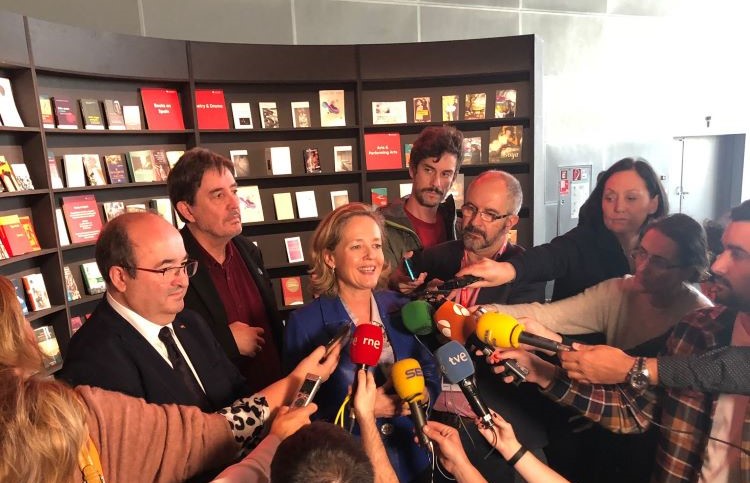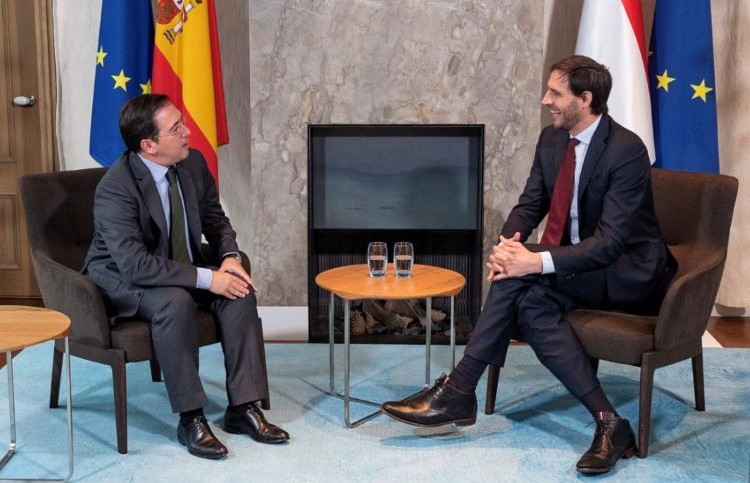The Diplomat
The First Vice President of the Government and Minister of Economic Affairs and Digital Transformation, Nadia Calviño, presented yesterday, at the headquarters of the Instituto Cervantes in Frankfurt, the main lines of the PERTE New Language Economy, a project designed by her Department to “take advantage of the potential” of a language, Spanish, “which is our oil”.
Calviño spoke yesterday at the colloquium Spanish and the economic power of language in the digital age, organized by Cervantes as part of the cultural and academic activities programmed by the Institute to celebrate the Frankfurt Book Fair, which has Spain as Guest of Honor. The Fair was inaugurated last Tuesday by the King and Queen of Spain and the President of the Federal Republic of Germany, Frank-Walter Steinmeier, coinciding with the first state visit to this country in 36 years.
The colloquium was moderated by Cristina Gallach, Special Commissioner for the Alliance for a New Language Economy -a government initiative to make Spanish a language of reference in the field of knowledge and artificial intelligence (AI)-, and was attended by the Minister of Culture, Miquel Iceta, and the director of the Cervantes Institute, Luis García Montero.
During the meeting, the vice-president summarized the main lines and the possibilities opened up by the Strategic Project for Economic Recovery and Transformation (PERTE, by its Spanish acronym) New Language Economy, a strategic project of her Ministry that has a budget of 1,100 million euros.
According to Calviño, Spain “must bet on infrastructures, which are not only highways”, but also digital projects that allow “to take advantage of all the potential of Spain with the language, which is our oil”. Thanks to the great opportunity of the European funds approved after COVID, she continued, AI will not only use English and Chinese, but will also be able to understand and communicate in Spanish, a language spoken by almost 600 million people in the world.
The five pillars of the PERTE New Language Economy -approved by the Council of Ministers on March 1 last-, according to the vice-president, are knowledge in Spanish and official languages, Artificial Intelligence in Spanish, science in Spanish, learning in Spanish and cultural industries. The first of these includes the creation of the Global Observatory of Spanish which, led by the Instituto Cervantes, will study the situation of our language from La Rioja, next to the monastery of San Millán de la Cogolla.
For his part, Miquel Iceta highlighted the advantage of Spanish because of its demographic value and the need for the language to adapt to the “new language, which is that of machines and Artificial Intelligence”. “We want machines to also think in Spanish and that, when we address them, they answer us in Spanish,” said the Minister of Culture. “Language can be a barrier, and PERTE wants to be a lever,” he added.
Miquel Iceta recalled the involvement of the Government through the Valle de la Lengua (Valley of the Language) initiative, coordinated with the Government of La Rioja, and he bet on involving Spanish-speaking countries in a project of common interest so that “they feel they are participants”. According to the minister, this proposal will be addressed during the IX International Congress of the Spanish Language, which the Instituto Cervantes, the RAE and the Academies will hold in Arequipa (Peru) next spring. The Minister concluded his speech by paraphrasing García Lorca (“Verde que te quiero verde”, “Green, I want you green”): “PERTE que te quiero PERTE”.
For his part, the director of the Instituto Cervantes assured that this “is the first time that a government has taken the language seriously”. “Defending Spanish culture is also defending the values of freedom and democracy,” said García Montero, who took advantage of his speech to recall that next Wednesday, October 26, the Cervantes Institute’s Yearbook 2022 El español en el mundo (Spanish in the world) will be presented.







